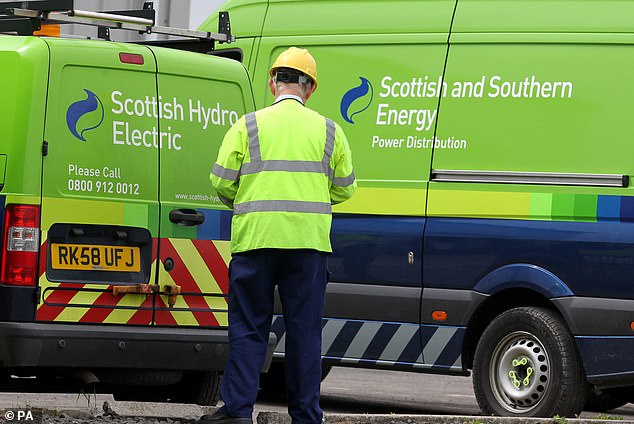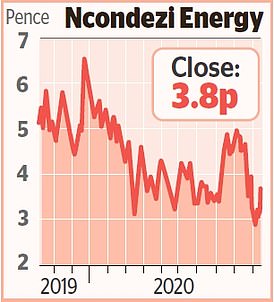MARKET REPORT: SSE powers up after deal to offload rubbish-burning plants in its bid to concentrate on renewable power
Investors cheered SSE after it struck a deal to sell stakes in plants that generate power from burning rubbish.
The energy group will sell its 50 per cent holdings in two sites that are up and running in Yorkshire and another which is in development, for £995million.
RBC Capital Markets analysts said the sale, to a fund owned by Australia-based First Sentier Investors, was at a price that ‘seems attractive’ compared with other similar deals.

Energy group SSE will sell its 50 per cent holdings in two sites that are up and running in Yorkshire and another which is in development, for £995m
For SSE, it marks another step forward in its bid to concentrate on renewable power.
This has so far involved selling its energy supply business to rapidly expanding rival Ovo Energy last year for £500million – with its goal to sell £2billion worth of less important businesses by next autumn.
After the energy-from-waste plant sales, it will have raised £1.4billion and given itself more fire power to maintain dividends, cut debt and splash £7.5billion buying low-carbon energy projects between now and 2025.
Traders were pleased, sending SSE shares to the top of the FTSE 100 leaderboard for much of the day.
It pared back gains later on, though stayed among the top ten risers, finishing 1.66 per cent higher, up 22p, to 1348p.
It was another subdued day for the wider Footsie, which failed to shrug off the tepid start to the week, falling by 0.53 per cent, or 31.67 points, to 5969.71 as dire UK unemployment figures spooked the market.
The FTSE 250 dropped 1.52 per cent, or 276.7 points, to 17891.01 as local lockdowns began looking more likely for areas including London.
The reverberations of the pandemic were also felt in hotel groups yesterday.
Hostel owner Safestay has shut another eight hostels for the time being, cutting the number of beds available by 45 per cent, as it admitted it couldn’t cover the costs of keeping them open.
It has also given staff the choice to take a 25 per cent pay cut or a share scheme if they cut their salary by 40 per cent. Its stock tumbled 8.3 per cent, or 1p, to 11p, while rival Hostelworld fell 4.5 per cent, or 2.5p, to 53p.
Commercial landlords had a tough day after Derwent London reported it had collected 80 per cent of rents for the most recent quarter.
This is higher than in the March and June quarters but it added that restaurant, bar and shop tenants were still struggling.
Derwent dropped 1.3 per cent, or 38p, to 2810p, as fellow landlords Land Securities – down 4 per cent, or 22.4p, by the close, to 536.1p – and British Land – down 4.6 per cent, or 17.3p, to 355.6p – also sank.
Government attempts to revive the property market with stamp duty cuts have boosted growth at property listings website group On The Market.
In the six months to the end of July revenue rose 28 per cent to £10.2million and swung to a £676,000 profit from a £7.2million loss last year, while advertisers using its site rose.
But warnings of higher costs on investment plans dragged on the shares, which dipped 3.9 per cent, or 4p, to 97.5p.
Ahead of the BHP annual meeting today, activists have withdrawn a resolution that had called on the company to cease all mining that could ‘disturb, destroy or desecrate’ Aboriginal sites in Australia.
The Australasian Centre for Corporate Responsibility said it had cancelled the vote after striking an ’11th hour’ deal with BHP.
The mining giant has been keen to defuse any tensions with local communities after rival Rio Tinto (down 0.3 per cent, or 15p, to 4714.5p) recently came under such intense criticism for destroying two 46,000-year-old caves that it fired three members of its top team.
BHP shares were almost flat, up 0.2 per cent, or 3.2p, to 1650p.

